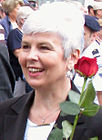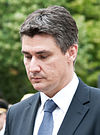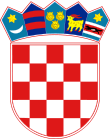- Croatian parliamentary election, 2011
-
Croatian parliamentary election, 2011 
2007 ←
members4 December 2011 → Next All 151 seats to Hrvatski sabor 


Leader Jadranka Kosor Zoran Milanović Josip Friščić Party HDZ Kukuriku HSS Last election 66 seats, 36.6% 67 seats, 43.6% 6 seats, 6.5% Current seats 65 63 6
Incumbent Prime Minister
2000 election • MPs 2003 election • MPs 2007 election • MPs Next election Croatia 
This article is part of the series:
Politics and government of
CroatiaConstitutionJudiciaryExecutive- President (List)
- Ivo Josipović
- Government (List)
- Prime Minister
- Jadranka Kosor
- Cabinet
- Prime Minister
- Croatian Democratic Union (HDZ)
- Social Democratic Party (SDP)
- Croatian People's Party -
Liberal Democrats (HNS-LD) - Croatian Peasant Party (HSS)
- Istrian Democratic Assembly (IDS)
- Croatian Democratic Alliance
of Slavonia and Baranja (HDSSB) - Croatian Social Liberal Party (HSLS)
- Croatian Party of Pensioners (HSU)
- Croatian Party of Rights (HSP)
Divisions
The 2011 Croatian parliamentary election will be held on Sunday, December 4, 2011 to elect 151 members to the Croatian Parliament.[1] This will be the 7th parliamentary election in Croatia since independence.
Contents
Background
After two consecutive wins in 2003 and 2007, the governing Croatian Democratic Union is hoping to secure yet another term in office. The Social Democrats will seek a first win after two consecutive parliamentary losses since 2000.
Events since the 2007 election
The 2007 election resulted in the formation of the Sanader II cabinet, supported by a narrow majority of 7. One of the main goals of the administration was completing Croatian negotiations with the European Union. Croatia had been a candidate for EU since 2005. In December 2008 Slovenia blocked the negotiation progress of Croatia due to a border dispute. Sanader and his Slovenian counterpart Borut Pahor were unable to settle their differences in the following months which meant Croatian's accession to the European Union was in a standstill.
The 2009 local elections were held on 17 and 31 May and resulted with the Social Democrats making considerable gains in certain traditionally HDZ-leaning cities and constituencies, such as Dubrovnik, Šibenik, Trogir and Vukovar, as well as retaining such major traditionally SDP-leaning cities as Zagreb and Rijeka.[2]
On 1 July 2009, Ivo Sanader announced he was resigning the Premiership and leaving his deputy Jadranka Kosor as Prime Minister. Parliament approved her and the new Cabinet which made Kosor the first woman ever to be appointed Prime Minister.[3] Ever since late 2008, SDP had been leading the polls, however by a narrow margin. After the sudden resignation of Sanader HDZ plummeted in the polls to their lowest level since 1999 when corruption scandals were rocking the party establishment.[4] There was much speculation, since Sanader hadn't given a reason for his departure, whether the Slovenian blockade was the cause for his resignation.
The new Premier, faced with a huge deficit and high unemployment, introduced an emergency budget aimed to reduce spending and the national debt. One of the most unpopular austerity measures taken along with the introduction of the budget was a new income tax called the "crisis tax" (krizni porez). In addition, the value-added tax rate was increased from 22% to 23%. The government's handling of finances was unpopular among the public resulting in the Prime Minister's dismal approval rating of 32% by the end of her first month. In the following months Kosor and Pahor met several times, trying to resolve the border dispute. The negotiations resulted in an agreement which led to the continuation of negotiations for the Croatian accession to the European Union. The solution was an Arbitration Agreement[5] which was signed in Stockholm on 4 November 2009, by both countries' Prime Ministers and the President of the EU, Fredrik Reinfeldt.[6]
In the last quarter of 2009 many public officials as well as members of the boards of various government agencies became suspected of participating in corrupt activities. Most of the accused were members of the governing Croatian Democratic Union which resulted in great criticism for Kosor, who claimed she was not familiar with any criminal activity from her colleagues in the party. Others, however, praised Kosor and her Government for finally starting to tackle the difficult issue of corruption. The Opposition accused the Prime Minister for political responsibility claiming that it was impossible that Kosor didn't know what was happening around her when she was a Vice President of the government almost seven years before becoming Premier. The accusations grew louder as more and more corruption affairs were tied with the former Prime Minister Ivo Sanader. On October 30, 2009, Damir Polančec, member of the HDZ Presidency, resigned as Deputy Prime Minister and Minister of the Economy following allegations of corruption.
On January 3, 2010, Ivo Sanader announced he was returning to active politics saying it was a mistake he ever left. He accused Kosor and the members of the HDZ Presidency of failed leadership citing Andrija Hebrang's poor result in the first round of the presidential election held just a week earlier. Hebrang achieved an embarrassing 12% claiming third place, the lowest result for an HDZ presidential candidate ever. Ivo Josipović, the candidate of the SDP, won a landslide victory in the resulting runoff on January 10. Most political pundits as well as the majority of the public believed the true reason of Sanader's surprise return was fear that he will eventually be tied with the numerous corruption scandals which have emerged since he left office. On January 4, the day after Sanader's coup as it was called by the press, the HDZ Presidency decided to expel Sanader from the party. On 9 December 2010 USKOK issues an arrest warrant on Ivo Sanader which results in him fleeing the country before his political immunity is stripped by Parliament.[7] He is put on the Interpol wanted list[8] and is arrested the following day in Salzburg, Austria.[9]
Throughout 2010, economy topped corruption as the biggest concern of the government. Industry shed tens of thousands of jobs, and unemployment soared. Consumer spending reduced drastically compared to record 2007 levels, causing widespread problems in the trade as well as transport industries. The import/export balance did derive a benefit from a large decrease in imports and a more tempered decrease in exports. The continuing declining standard resulted in a quick fall in both the Prime Minister's as well as government's support.
The recession and high unemployment continued throughout 2011 resulting in many anti-government protests around the country.[10] On 15 April former Croatian general Ante Gotovina was sentenced to 24 years in prison by ICTY after being found guilty of war crimes during Operation Storm.[11] This caused great dissatisfaction in Croatia, especially on the political right. Investigations on the governing party's 'black funds' intensified in 2011 after former HDZ treasurer Branka Pavošević testified to USKOK about the illegal finances used for previous elections, including Jadranka Kosor's own 2005 presidential campaign.[12] The investigation resulted with the Attorney General issuing an indictment against HDZ as a legal entity.[13]
On 28 October MPs voted to dissolve Parliament.[14] President of the Republic Ivo Josipović agreed to a dissolution of Sabor on Monday, 31 October and scheduled the election, as previously suspected, for Sunday, December 4.[15]
Date of the election
The regular parliamentary election after the Croatian parliamentary election, 2007 was to be held on or before 11 March 2012, which was the last constitutional deadline.[16]
The unstable political climate following the resignation of the Prime Minister Ivo Sanader in July 2009 prompted many political observers and experts to raise the possibility of an early general election. This did not materialize, rather, the Cabinet of Jadranka Kosor decided to continue with some changes in personnel.
Prime Minister Jadranka Kosor had repeatedly stated that they would most likely be held in late 2011, presumably in November.[17]
The tentative election date was the last Sunday of November 2011, however many pundits as well as opposition politicians had guessed that the election could be held earlier, in order to coincide with the pending European Union accession referendum.[18]
The final date was decided by the ruling parties on 15 July.[1]
Electoral system
Since 1999 Croatia has been divided into 10 geographically-based electoral districts. These districts are named using Roman numerals and were formed according to the number of voters so that each district holds around 250,000–300,000 registered voters. These districts therefore do not correspond to the borders of top administrative divisions within Croatia and each district contains one or more or parts of several Croatian counties.
Each district sends 14 MPs to the parliament and winning candidates are determined using the party-list proportional representation voting system. This means that parties make lists of 14 candidates to be elected, and seats get allocated to each party in proportion to the number of votes the party receives, with the election threshold set at 5 percent of votes in each district, calculated using the standard D'Hondt formula.
In addition, there are two non-geographical districts. In District XI, 3 members are chosen by proportional representation to represent Croatian citizens residing abroad (this district is commonly referred to as the diaspora electorate). Although all people living outside Croatia are eligible to vote for this list, the majority of voters who turnout for this list traditionally consists of Croats of Bosnia and Herzegovina, the majority of whom hold dual Croatian and Bosnian citizenships. In District XII an additional 8 members are elected to represent the 22 ethnic minorities in Croatia which are legally recognized as such in the Croatian Constitution, with 3 of these seats reserved for the Serbian minority.
Since the seats are allocated according to the proportion of votes received in each district, parties usually nominate senior party officials on top of their lists in districts where they have traditionally enjoyed good levels of support, to ensure that the party's most prominent members win parliamentary seats. All candidates are elected to four-year terms. However, many MPs who are members of post-election ruling coalitions often get appointed to various ministerial and government positions while others serve as city mayors or directors of various government agencies. In such cases they are required by law to put their parliamentary mandate on hiatus for the duration of their other term in office and their seats are then taken by party-appointed deputy MPs.
Changes
The Constitution and consequently the electoral law has been changed in June 2010[19] to give District XI 3 fixed seats. In the past, the amount of seats given to the district was proportional to the number of voters taking part. In the last elections in 2007, this resulted in 5 seats being allocated to the district.
In December 2010, the Constitutional Court of Croatia decided to inform the Parliament of a necessity to update the electoral unit definitions according to current population data, in accordance with the provisions of the 1999 Law on electoral units.[20]
Political parties
Main article: List of political parties in CroatiaThe main actors of the election remain entrenched from the previous election cycle - the right-centre block led by the Croatian Democratic Union, and the left-centre block led by the Social Democratic Party of Croatia.
The main supporting party of the right-centre block is the Croatian Peasant Party. In 2011, President of Croatian Peasant Party announced that his party will not be part of center right coalition with Croatian Democratic Union.
The main supporting party in the left-centre block is the Croatian People's Party - Liberal Democrats. The left-centre block officially joined an electoral coalition called Alliance for Change in 2010, renamed to Kukuriku coalition in 2011.
In 2010, the Croatian Social Liberal Party lost representation in Parliament because of an internal split between Ivan Čehok, Đurđa Adlešič and others with newly elected party leader Darinko Kosor.
In 2009, former MP Ruža Tomašić (formerly of the Croatian Party of Rights) founded the "Croatian Party of Rights dr. Ante Starčević".
In 2010, MP Dragutin Lesar (formerly of the Croatian People's Party) founded the Croatian Labourists – Labour Party.
In 2011, MP and former candidate for premier Ljubo Jurčić announced he would be leaving the Social Democratic Party of Croatia and found his own party to contest the elections.[21]
Coalitions and lists
- Croatian Democratic Union: independently in districts I-V, VII, VIII
- With Democratic Centre: district VI
- With Croatian Citizen Party: districts IX and X
- Social Democratic Party of Croatia - Croatian People's Party – Liberal Democrats - Istrian Democratic Assembly - Croatian Party of Pensioners: all districts
- Croatian Peasant Party: independently in districts II-VI, IX
- With Green Party and Party of Pensioners: district I, VII, VIII, X
Opinion polling
See also: Exit poll and Opinion pollReferences
- ^ a b "Imamo datum izbora! Novu vlast birat ćemo 4. prosinca 2011." (in Croatian). Jutarnji list. 15 July 2011. http://www.jutarnji.hr/datum-izbora--parlamentarni-izbori-odrzat-ce-se-4--12--2011-/959528/. Retrieved 15 July 2011.
- ^ "Ponovljeni izbori: SDP dobio Šibenik i Trogir" (in Croatian). Nacional. 15 June 2009. http://www.nacional.hr/clanak/60145/ponovljeni-izbori-sdp-dobio-sibenik-i-trogir. Retrieved 2 December 2009. (Croatian)
- ^ "Croatia's PM Sanader resigns, quits politics". Reuters. 1 July 2009. http://in.reuters.com/article/worldNews/idINIndia-40733720090701. Retrieved 2 December 2009.
- ^ "Nikad veća razlika: SDP 'potukao' HDZ" (in Croatian). Nova TV. 1 August 2009. http://dnevnik.hr/vijesti/hrvatska/sokantni-rezultati-istrazivanja-sdp-potukao-hdz.html. Retrieved 2 December 2009.(Croatian)
- ^ "Premiers Kosor, Pahor say two countries at watershed, politics must find solutions". Government of Croatia. 2009-10-26. http://www.vlada.hr/en/naslovnica/novosti_i_najave/2009/listopad/predsjednica_vlade_s_predsjednikom_vlade_republike_slovenije_borutom_pahorom. Retrieved 2009-11-04.
- ^ "Croatia, Slovenia open new chapter in their relations, PMs say". Government of Croatia. 2009-11-04. http://www.vlada.hr/en/naslovnica/novosti_i_najave/2009/studeni/predsjednica_vlade_rh_kosor_i_predsjednik_slovenske_vlade_pahor_otvorena_nova_stranica_u_odnosima_dviju_zemalja. Retrieved 2009-11-04.
- ^ Sanader u bijegu: Preko granice ga odvezla kći, on čitao novine, Večernji list
- ^ Wanted: SANADER, Ivo, Interpol
- ^ Croatian ex-PM Ivo Sanader arrested in Austria, BBC News
- ^ Rastrgali zastavu HDZ-a, zapalili SDP-ovu i EU-a, Novi list
- ^ HAŠKA PRESUDA: Gotovina je izgledao mirno, a u njemu je ključalo. Čeljust mu se tresla, Jutarnji list
- ^ Iskopana tajna: HDZ s prljavih 13 milijuna kuna financirao Jadranku Kosor, ali i Houdeka, Škoru, Kindl..., Jutarnji list
- ^ J. Kosor: Neću dati ostavku i nećemo dopustiti da se HDZ uruši, Večernji list
- ^ Pogledajte sve snimke sa suđenja Sanaderu, Nova TV
- ^ Predsjednik Josipović raspisao izbore!, Nova TV
- ^ Borba za prevlast po izbornim jedinicama, Jutarnji list (Croatian)
- ^ Umjesto na proljeće, izbori će biti tek krajem 2011., Net.hr (Croatian)
- ^ "Čačić: Vladajući će iskoristiti završetak pregovora s EU kako bi raspisali izbore" (in Croatian). Nacional. 27 May 2010. http://www.nacional.hr/clanak/84381/cacic-vladajuci-ce-iskoristiti-zavrsetak-pregovora-s-eu-kako-bi-raspisali-izbore. Retrieved 1 June 2010.(Croatian)
- ^ "Sabor uz potporu većine izglasovao ustavne promjene" (in Croatian). Večernji list. 2010-06-16. http://www.vecernji.hr/vijesti/sabor-potporu-vecine-izglasovao-ustavne-promjene-clanak-156373. Retrieved 2010-12-08. (Croatian)
- ^ "Ustavni sud Saboru: Treba mijenjati zakon o izbornim jedinicama" (in Croatian). Poslovni dnevnik. HINA. 2010-12-08. http://www.poslovni.hr/vijesti/ustavni-sud-saboru-treba-mijenjati-zakon-o-izbornim-jedinicama-165871.aspx. Retrieved 2010-12-08. (Croatian)
- ^ http://www.setimes.com/cocoon/setimes/xhtml/en_GB/newsbriefs/setimes/newsbriefs/2011/05/27/nb-06
Elections and referendums in Croatia As part of Austria-Hungary (1860s–1918)Kingdom of Croatia-Slavonia Kingdom of Dalmatia Modern Croatia (1990–present)Parliamentary elections Presidential elections Chamber of Counties elections Local elections Referendums (For the 1918–1989 period see Elections in Yugoslavia)Categories:- Elections in Croatia
- 2011 elections in Europe
- President (List)
Wikimedia Foundation. 2010.
